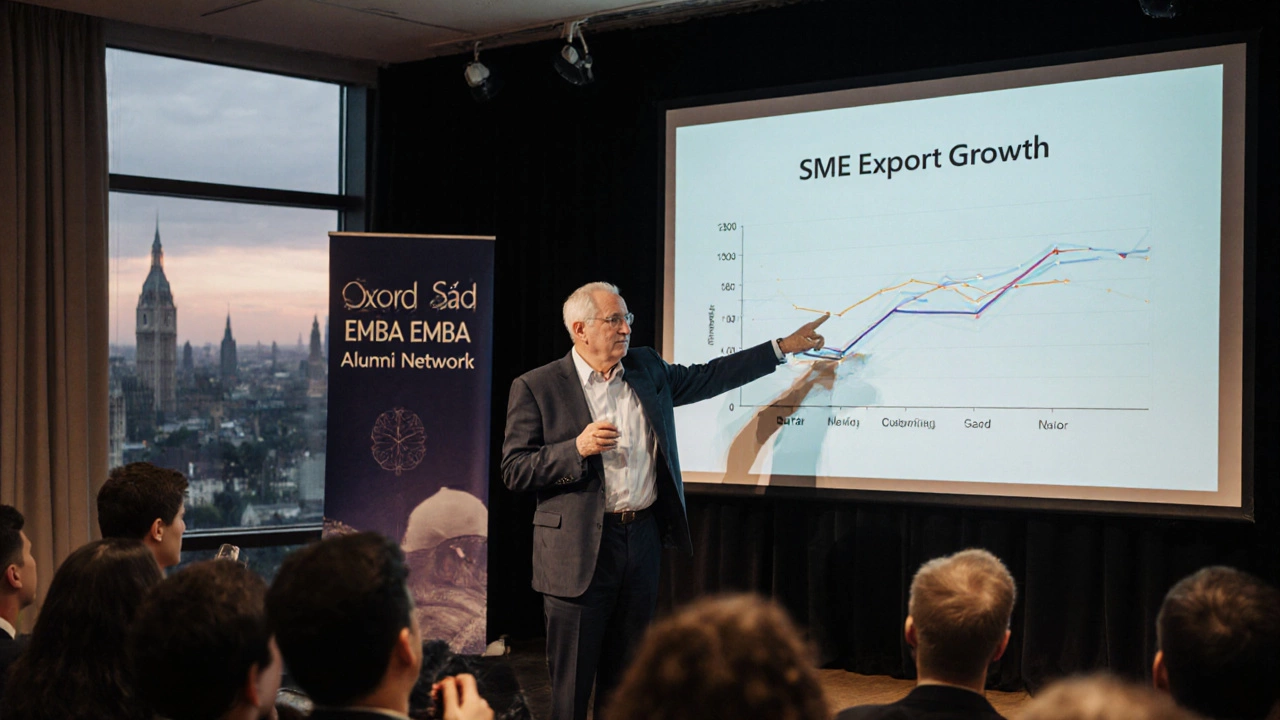MBA ROI Calculator for Professionals Over 50
Calculate Your MBA Return on Investment
Your Estimated ROI
Article Insight: The median salary bump for EMBA grads over 50 is 22%, according to the Graduate Management Admission Council's 2024 survey. The real cost isn't tuition—it's time investment.
You’re 50. You’ve built a career, raised a family, maybe even sold a business. Now you’re wondering: is it too late to go back to school for an MBA? The answer isn’t yes or no-it’s yes, if you’re chasing a corporate ladder, and absolutely not, if you’re chasing purpose, impact, or a new chapter.
Why People Ask This Question
The question isn’t really about age. It’s about fear. Fear that you’ll be the oldest in the room. Fear that employers won’t hire you after graduation. Fear that you’ve missed the boat. But the truth? The MBA landscape changed years ago. The average age of full-time MBA students in top U.S. programs is now 28. But the average age of executive MBA students? 39. And it’s climbing. In 2024, 12% of incoming EMBA students at London Business School were over 50. At INSEAD, it was 9%. These aren’t outliers-they’re a growing trend.What Schools Actually Want
Business schools don’t want 22-year-olds with perfect GPAs anymore. They want people who’ve lived. They want leaders who’ve managed teams through crises, navigated mergers, or turned around failing departments. At 50, you’ve got that. You’ve seen market cycles, economic crashes, and tech disruptions. You’ve learned how to read people, not just balance sheets. That’s gold in an MBA classroom.Harvard Business School’s EMBA program doesn’t even ask for GMAT scores for applicants over 45. They care about your professional impact, not your test scores. Wharton’s EMBA program has a section in their application titled “Leadership Experience,” not “Academic Potential.” They’re looking for people who’ve already led-and want to lead better.
The Real Cost: Time, Not Money
Yes, an MBA costs money. A full-time program can run $100,000+ in the U.S. But for someone over 50, the real cost isn’t tuition-it’s time. You’re not skipping a promotion. You’re not giving up your first job. You’re giving up evenings, weekends, and maybe a few vacations. That’s the trade-off. But here’s the flip side: if you’re already earning six figures, you can often get your employer to pay for part of it. Over 60% of EMBA students get some form of company sponsorship. And if you’re self-funded? Think of it as an investment with a 5-year payback period. The median salary bump for EMBA grads over 50 is 22%, according to the Graduate Management Admission Council’s 2024 survey.
Who Should Skip It
Not everyone needs an MBA at 50. If your goal is to land a junior role at a tech startup, don’t do it. If you’re hoping to become a VP at a Fortune 500 company right after graduation, think again. Most senior roles at big firms go to people who’ve climbed the ladder internally. An MBA won’t shortcut that.But if you want to start your own company, pivot into a new industry, or become a board member? An MBA is one of the most powerful tools you can use. The network alone is worth it. You’ll sit next to people who run private equity funds, lead healthcare systems, or advise governments. These aren’t classmates-they’re future partners.
Programs That Welcome Older Students
Not all MBA programs are built the same. Full-time, two-year programs? They’re designed for people in their late 20s. Executive MBAs? Designed for people who’ve been working for 15+ years. That’s your lane.Here are a few programs known for accepting and supporting students over 50:
- London Business School EMBA - Average age 41, 12% over 50, part-time, global modules
- INSEAD EMBA - One-year program, 10% over 50, campuses in Europe, Asia, and the Middle East
- MIT Sloan EMBA - 50% of students are over 40, strong focus on innovation and entrepreneurship
- University of Oxford Saïd Business School EMBA - Average age 40, 8% over 50, strong in social impact and leadership
- Columbia Business School EMBA - 20% of students are over 45, excellent for finance and media careers
These aren’t “mature student” programs-they’re elite programs that simply don’t care if you’re 50. They care if you’ve done something meaningful.
What You’ll Learn That You Can’t Get Elsewhere
At 50, you know how to manage people. But do you know how to build a financial model for a startup? How to lead a digital transformation? How to read a balance sheet like a strategist? An MBA gives you a structured way to fill those gaps. It’s not about theory-it’s about tools you can use next Monday.One student, 53, took an EMBA at Oxford to transition from running a family manufacturing business to advising SMEs on export strategy. He didn’t want to retire-he wanted to scale his impact. He used the school’s entrepreneurship lab to build a consulting framework. Within six months, he had three clients. The MBA didn’t give him a job. It gave him a new way to work.

Networking: The Real ROI
Forget LinkedIn connections. An MBA gives you access to a tight-knit group of people who’ve been where you are. At 50, you don’t need more casual contacts. You need trusted advisors. The people you meet in your EMBA cohort? They’ll be the ones who refer you to investors, recommend you for board seats, or invite you to speak at industry events.At INSEAD, a 51-year-old former airline executive met a 48-year-old founder of a renewable energy startup. Two years later, they launched a joint venture to retrofit commercial fleets with electric powertrains. That connection? It happened in a classroom.
What to Do Next
If you’re serious, here’s your 3-step plan:- Identify your goal - Are you starting a business? Switching industries? Becoming a consultant? Your goal determines the program type.
- Find the right EMBA - Look for programs with strong part-time options, global modules, and a track record of older students. Avoid full-time programs unless you’re ready to quit your job.
- Talk to alumni over 50 - Most schools have alumni networks. Reach out. Ask: “What did you wish you knew before starting?” Most will reply.
Don’t wait for the “perfect time.” There isn’t one. The best time to start was 10 years ago. The second best time is now.
Frequently Asked Questions
Is it worth getting an MBA at 50 if I’m close to retirement?
It depends on what you want to do after. If you plan to retire in two years, probably not. But if you want to start a second career-consulting, teaching, launching a social enterprise-then yes. Many EMBA graduates over 50 use the degree to launch a nonprofit, join a board, or teach part-time at a university. The ROI isn’t salary-it’s legacy.
Will employers hire me after 50 if I get an MBA?
You won’t get hired for entry-level roles. But you’ll be in high demand for advisory, board, or leadership positions. Companies are actively seeking experienced leaders who understand both traditional business and modern trends like AI, ESG, and digital transformation. An MBA signals you’ve updated your skills, not that you’re starting over.
Can I afford an MBA at 50?
Most EMBA programs offer scholarships for experienced professionals. Many employers pay 30-70% of tuition. In the UK, some programs allow you to defer payments until after graduation. And if you’re self-funding, consider it a long-term investment. The average EMBA grad over 50 sees a 22% salary increase within three years. That’s often enough to cover the cost in under two years.
Do I need to take the GMAT if I’m over 50?
No, not always. Many top EMBA programs waive the GMAT for applicants with 15+ years of leadership experience. London Business School, Oxford Saïd, and Columbia all do this. They focus on your career achievements, recommendations, and essays instead. Your resume is your test score.
What’s the biggest mistake people over 50 make when applying?
Trying to sound like a 25-year-old. Don’t downplay your experience. Don’t apologize for your age. Schools want your story-the wins, the failures, the lessons. Your authenticity is your advantage. The most successful applicants over 50 don’t try to fit in. They stand out by being exactly who they are.
